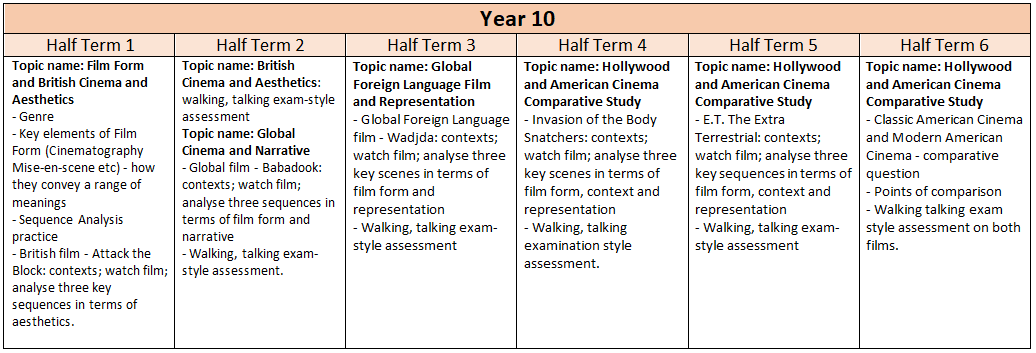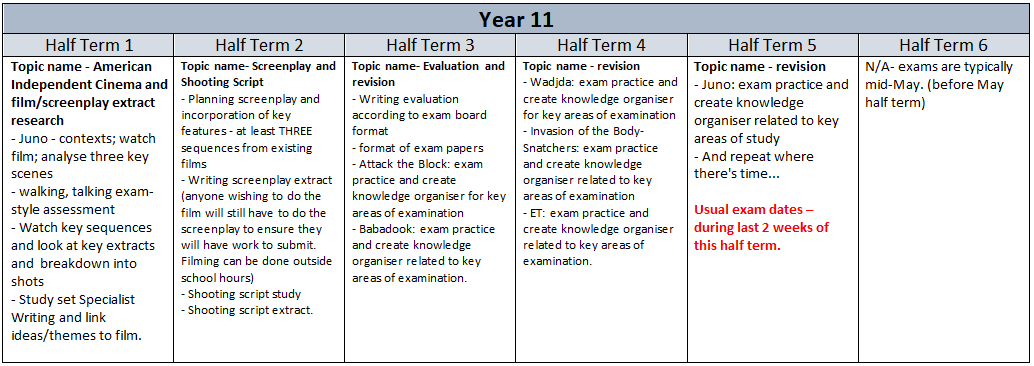Film Studies



Curriculum Intent
Our curriculum vision applies to all our young people, regardless of background, gender, sexual orientation or ability.
Our young people will develop a life-long love of learning through our rich, broad and balanced curriculum and expert delivery.
All students at Heworth Grange School are without exception entitled to a world-class education that is holistic, ambitious and aspirational.
It is vital that we prepare our young people so that they are empowered to become engaged positive and respectful citizens through a dedicated focus on professional development.
We are responsible for ensuring our young people are confident to pursue ambitious next steps in education, employment or training which will support their future careers.
Knowledge and skills:
Through our curriculum, students:
- Build knowledge and understand how concepts and skills link between topics and subjects. The foundation of the Film curriculum is the study and application of film form and the understanding of the way it conveys meanings. We cover this in a series of foundation lessons and the knowledge is retrieved, reinforced and developed throughout the course, then knowledge of it informs the creation of the students’ own practical work in the second year.
- Develop confidence in communication skills through individual, pair and group work, and they are encouraged to critically question texts and the reading of texts.
- Develop a love of reading and the skills to read fluently, having opportunity to explore wider significant and exclusive texts. We encourage students to read texts for meaning and, where time permits, apply that reading to contextual texts that are not part of the course.
- Learn to self-regulate and work independently as well as collaboratively. While collaboration is key to classwork, the application of the knowledge they’ve gained in the production work is very much independent and depends on individual research and self-regulation.
- Learn about the world around them and inclusive historical contexts. We study political, historical, social and industrial contexts to ensure students know how they affect the narrative and construction of the final text.
- Will have the opportunity for deep thinking and to get into their ‘flow’. Deep thinking is a necessary component of the course because of the microanalysis of key scenes and the way this is applied to the key areas of study for each text.
Curriculum Overview
Click on the document at the bottom of this page to view an easy-read version of the full curriculum overview.


GCSE Film Studies
Overview
In this dynamic, creative, and challenging course, students learn how a range of possible meanings are conveyed through Film Form (cinematography, mise-en-scene, editing, sound) and analyse key scenes in the set films. The course also encourages the understanding of key issues and developments within history, society, and culture because all the films we study have been purposefully chosen to offer rich and interesting analysis and represent different time periods and moments in history showing alternative representations of culture and people. Students will also develop their creativity by using the knowledge gained from the study of film to make their own short film or screenplay.
The analytical skills and the historical and cultural perspectives students develop are eminently transferable across a range of other subjects, like English and History. If pupils pursue the screenplay option, writing skills for English will be enhanced. The aesthetic aspects of film study and production are linked to skills required of Art and Textiles students. We have shown in the past that these skills will improve their opportunities to study a variety of academic subjects at A Level and beyond. All the local universities, including Durham, offer courses in Film as do many major universities, including Oxford and Cambridge. We have many ex-students who have gone on to university and are now using their talents in areas of the media and some, like Mrs. Owen’s husband, who has his own award-winning small film company working directly in the film/television industry. At our first attempt, one of our last A Level students won the exam board’s short film award of 2019 and she is now studying filmmaking at university. However, other students have gone on to study a variety of subjects, like English Language or Literature, Art, Journalism, Modern Languages, Textiles and Media.
Do not take the course if you expect to sit around watching films all day. It will not happen. We have a good track record of people who work hard and go on to do well at A Level and beyond.
Topics and Course Structure
We follow the EDUQAS specification:
- 30% coursework
- 70% final exam.
All units study the way Film Form creates meanings for the audience. Each unit has its own specialist areas. The exam is divided into two components and each exam lasts one and half hours.
Year 10 GCSE: – at the moment, we prefer to start with Component 2.
Component 2: Narrative, Representation and Film Style
- Contemporary British Film – Attack the Block (Joe Cornish, 2011): a British sci-fi/horror film. We study how the film’s aesthetic – a mix of sci-fi, horror and dystopian urban Britain - is created.
- Global English Language Film – Rabbit Proof Fence (2002): an Australian drama about the treatment of mixed- race children. We look at the narrative, context, and representation.
- Global non-English Language Film - Let the Right One In (2008): a Swedish horror film. The study area is representation of characters or country or society or culture.
Component 1: Key Developments in US Film
- Integrated Study of Film, including Genre: Comparative US Film Study: A Cold War American sci-fi film, Invasion of the Body Snatchers (1956). Genre, representation, and context are particularly significant here.
Year 11 GCSE:
Component 1: Key Developments in US Film (cont.)
- Integrated Study of Film, including Genre: The Comparative US Film Study: A more recent American sci-fi film, E.T. The Extra-Terrestrial (1982). We look at genre, representation, and context.
- US Independent Film - focus on Specialist Writing: Little Miss Sunshine (2006), a black comedy. The film is studied with specific reference to a piece of critical writing.
- Key Developments in Film and Film Technology – a five-mark exam answer: essentially a memory test that asks students to retrieve information studied during Y11.
Component 3: Production
A practical production where students have the choice of making a short film extract (one and half to two minutes long) or a screenplay extract (800–1000 words) from a list of specified genres. Their production will be informed by the knowledge of cinema acquired during the rest of the course. The screenplay will be accompanied by a shooting script to note details of cinematography, editing, timing and sound to match one minute of the screenplay. Both will require a written evaluation of 750 – 850 words.
Additional Information & Who to contact
Click here to view the Film Studies Specification
If you require any further information or have any questions, then please contact Mrs Owens on heworthgrangeenquiries@consilium-at.com






